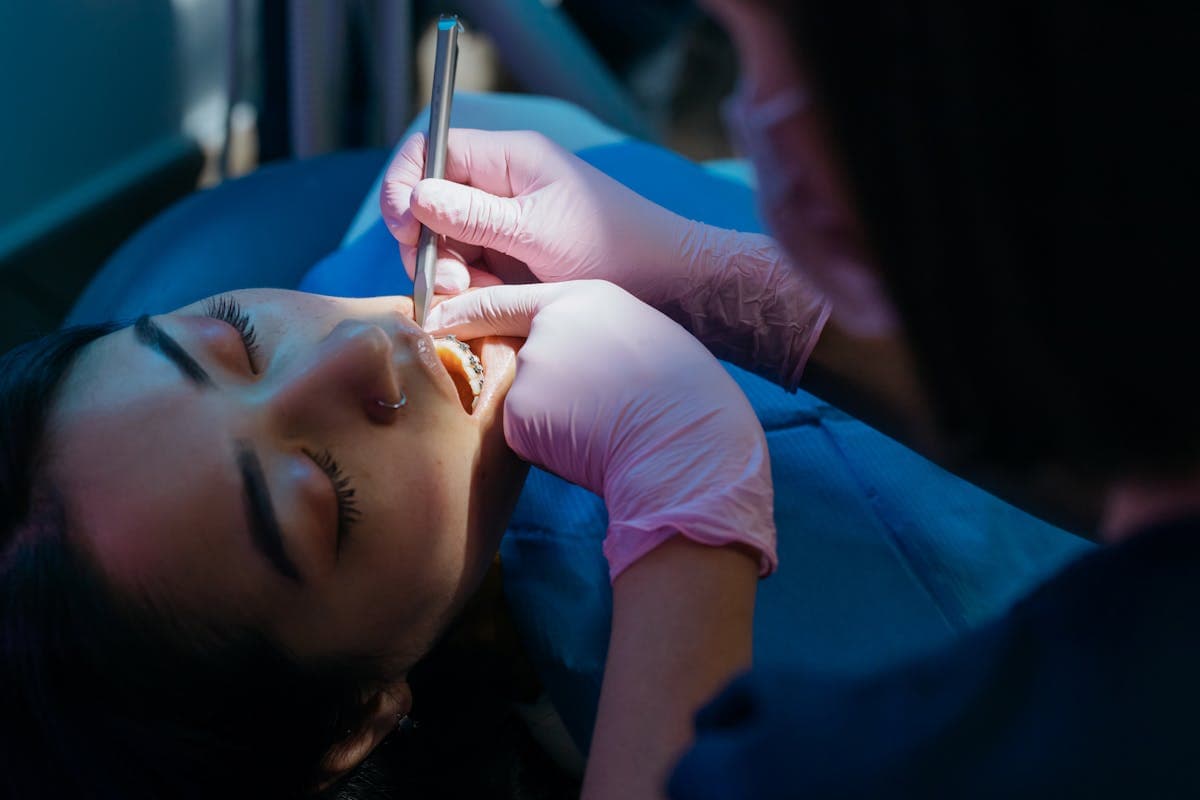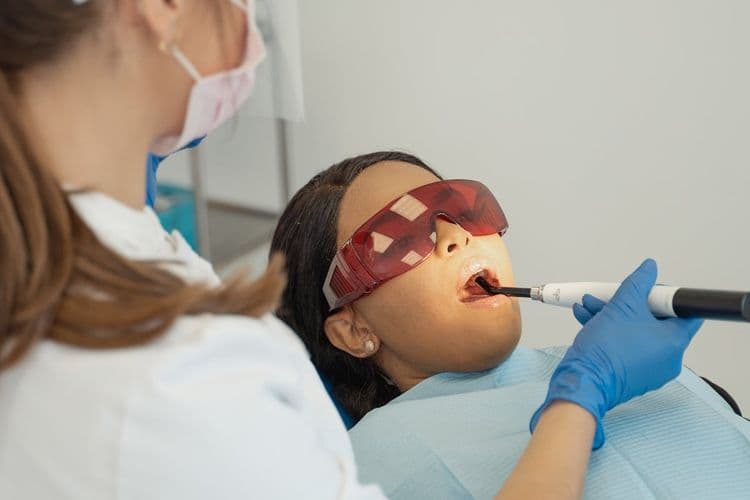Laser gum surgery has revolutionized periodontal treatment, offering a less invasive alternative to traditional methods. However, the post-operative phase, while typically less challenging, still brings about certain considerations. While immediate discomfort and swelling subside within a couple of days, there are other factors such as diet modification, pain management, and oral hygiene that need attention. Regular follow-up appointments are also essential. This discussion aims to explore these aspects further, providing an extensive understanding of what to expect during recovery from laser gum surgery.
Understanding Laser Gum Surgery
Laser gum surgery, also referred to as laser periodontal therapy, is an innovative dental procedure utilized to treat gum disease effectively. This advanced technique employs the use of a specialized dental laser, providing several notable laser benefits, such as less pain, minimal bleeding, and quicker recovery time. The procedure overview involves the laser targeting and removing the inflamed gum tissue from around the root of the tooth. Once the infected tissue is removed, the remaining gums are cleaned, removing any plaque build-up. The laser then aids in sealing the gums to prevent any future bacterial infections. Offering a less invasive option, laser gum surgery paves the way for a more comfortable dental experience and a swift return to daily routines.
Expected Post-Surgery Symptoms
What can patients expect following their laser gum surgery? Typically, the initial symptoms post-surgery include minor discomfort and swelling in the treated area. Swelling reduction is a part of the initial recovery phase, which typically occurs within the first 24 to 48 hours following the procedure.
Throughout the healing timeline, patients may also notice their gums lightening in color. This is a normal part of the healing process as the tissue regenerates. It’s essential to acknowledge that each patient’s recovery may differ slightly based on individual health conditions and the extent of the surgery. Regular follow-up appointments with your dental surgeon will guarantee that your recovery is on track, allowing for any necessary adjustments in your treatment plan.
Managing Pain After Surgery
Managing pain effectively is a vital aspect of the post-operative phase of laser gum surgery. This stage will encompass understanding post-operative pain control measures and strategies to alleviate discomfort. It is imperative for patients to acknowledge and apply these methods to facilitate a smoother recovery process.
Post-Operative Pain Control
While the concept of post-operative pain may seem intimidating, it is a manageable aspect of recovery after laser gum surgery. To guarantee pain relief, a variety of medication options are available, typically prescribed by your dental professional. These may include non-steroidal anti-inflammatory drugs (NSAIDs), such as ibuprofen, or stronger painkillers if needed. It’s vital to follow the prescribed dosage instructions to optimize pain control. Complementing this, cold compresses can also be applied to the cheek area to reduce swelling and discomfort. It’s important to remember that every individual’s pain threshold varies, so it’s imperative to communicate with your healthcare provider about your pain levels. Effective post-operative pain control is a significant step in guaranteeing a smooth, comfortable recovery.
Overcoming Discomfort Strategies
As patients navigate the path to recovery after laser gum surgery, understanding effective strategies for overcoming discomfort is paramount. Pain management extends beyond medication, incorporating non-pharmacological approaches like distraction techniques and relaxation methods. Distraction techniques divert the patient’s attention, thereby reducing the perception of pain. This could include watching television, reading, or engaging in light activities. Relaxation methods, such as deep breathing exercises or guided imagery, can help reduce muscle tension and lower stress levels, which are often heightened after surgery. These techniques, combined with recommended medication, can considerably alleviate post-operative discomfort. Remember, every individual’s recovery journey is unique, and what works best may vary. Consequently, exploring various strategies to manage pain effectively can be highly beneficial.
Nutrition and Diet Guidelines
What should you eat after a laser gum surgery? Your diet plays a vital role in your recovery process. Soft, nutritious foods like yogurt, mashed potatoes, and scrambled eggs are recommended to prevent any discomfort during eating. Including dietary supplements in your nutrition plan can be beneficial. Supplements rich in vitamin C and zinc can aid in healing and tissue growth. Hydration is also of utmost importance. Drink enough water to facilitate essential body functions and to keep your mouth moist. Avoid hot or spicy foods and drinks, as they might cause irritation. Also, refrain from consuming alcohol and smoking, as they can delay the healing process. To conclude, a well-balanced and thoughtful diet is a key contributor to a smooth recovery.
Oral Hygiene Practices
Maintaining a rigorous oral hygiene routine is instrumental in the healing process following laser gum surgery. Ideal oral care is achieved through a combination of effective brushing techniques and the use of appropriate dental products. Brushing should be gentle and thorough, covering all tooth surfaces and the tongue. An extra-soft-bristled toothbrush may be recommended initially to avoid irritating the sensitive post-surgery gums. Using an antimicrobial, alcohol-free mouthwash can further aid in keeping the oral cavity clean and free from infection. Additionally, regular, gentle flossing will remove plaque and food particles that brushing may miss. Remember, while maintaining oral hygiene is always important, it is vital during the recovery period to protect the gums and guarantee ideal healing.

Physical Activity and Rest
Balancing physical activity and rest is essential in the recovery process following laser gum surgery. One must be aware of the limitations on exercise post-surgery to prevent complications or delays in healing. In addition, the importance of adequate rest to facilitate ideal recovery and healing cannot be overstated.
Post-Surgery Exercise Limitations
While it is natural to want to return to your regular exercise routine after undergoing laser gum surgery, it’s essential that you understand the limitations and necessary modifications to guarantee proper healing. Your surgeon will provide specific exercise restrictions and activity guidelines to follow during the recovery period. Generally, strenuous physical activities should be avoided for a few days to a week after surgery. This includes heavy lifting, running, and high-impact sports. Light activities such as walking, stretching, or yoga can be resumed sooner, but always consult with your health care provider first. Your individual recovery timeline will depend on factors like your overall health, age, and the complexity of your surgery. Carefully adhering to these post-surgery exercise limitations aids in preventing complications and promotes ideal healing.
Importance of Adequate Rest
Adequate rest, an essential component in the recovery process after laser gum surgery, cannot be overstated. The rest duration considerably impacts the recovery timeline, promoting healing and reducing complications. The healing potential of the human body is greatly enhanced during periods of rest, as it allows the body to focus its resources on repairing the surgical site. Additionally, adequate rest also helps in managing postoperative pain and discomfort, an important aspect of recovery. Consequently, it is important to follow the recommended rest duration specified by your dental surgeon. Ignoring the need for rest can compromise the recovery timeline and cause unnecessary physical strain, potentially leading to complications. Fundamentally, proper rest is an integral part of a successful recovery from laser gum surgery.
Signs of Complications
How can you recognize if your recovery from laser gum surgery is not progressing as expected? An important part of post-operative care is being vigilant to complication signs that may indicate a problem. These signs can vary, but commonly include:
- Persistent Pain: While some discomfort is normal after surgery, severe or increasing pain could be a sign of complications.
- Swelling or Redness: Some swelling is expected, but if it worsens or is accompanied by redness, this may indicate infection symptoms.
- Unusual Discharge: Any pus or bleeding outside of the initial recovery period could signify an issue.
Recognizing these signs early can help guarantee that any potential complications are addressed promptly, facilitating a smoother recovery.
Regular Follow-up Appointments
In light of understanding the potential complications, it becomes even more evident why regular follow-up appointments are a significant part of the recovery process post laser gum surgery. These appointments are critical for evaluating the healing process, addressing any concerns, and preventing complications. The follow-up frequency typically depends on the patient’s condition and recovery speed, with more frequent visits required in the initial stages. To guarantee adherence to these follow-ups, it is advisable for patients to utilize appointment reminders. This can be in the form of digital alerts or traditional phone calls from the dental office. Ultimately, these regular check-ins contribute to a swift, smooth, and successful recovery, underscoring the importance of regular follow-up appointments post-surgery.
Frequently Asked Questions
Can I Return to Work Immediately After the Laser Gum Surgery?
Post-procedure, immediate return to work is feasible, but depends on individual pain management and specific work accommodations. It’s advisable to consult with your healthcare provider for personalized advice regarding your recovery timeline.
Will My Insurance Cover the Cost of Laser Gum Surgery?
Insurance coverage for laser gum surgery varies widely among providers. It’s essential to consult with your insurance company to understand the extent of coverage for such procedures and determine your out-of-pocket surgery costs.
How Will Laser Gum Surgery Affect My Speech?
Laser gum surgery may temporarily affect speech due to swelling or discomfort. However, these speech changes are usually short-lived. Follow recovery tips like gentle rinsing and avoiding strenuous oral movements for a swift recovery.
What Should I Do if I Accidentally Dislodge the Surgical Dressing?
If the surgical dressing is accidentally dislodged, immediate post-surgery care is essential. Contact your dentist promptly for a dental follow-up appointment to guarantee proper healing and prevent potential complications.
How Long Will It Take Before I Can Return to My Regular Oral Care Routine?
Typically, you can resume your regular oral hygiene routine about two weeks post-surgery, following the post-surgery guidelines provided. However, it’s essential to follow oral hygiene tips to prevent any complications during the recovery period.


